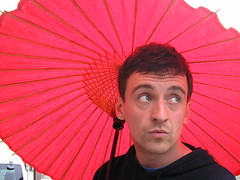Neuromancer created a dense, vivid and believable world, echoes of which are still heard in science fiction today, but it's true legacy is that words like "cyberspace" have entered into common usage.
It’s strangely appropriate that a novel this young can be described as a classic, because Gibson writes about the ways in which technology that advances with increasing speed changes people and their perceptions. In many ways, technology has left his vision behind – it’s funny to read him writing with gravity about “thousands of megabytes,” but I don’t suppose too many people thought in gigabytes back in the eighties.
The tough and relentless prose drops the reader straight into the underbelly of a futuristic Japan, refracted through dream-like imaginings of the technological and economic marvel it may have seemed back then, complete with slang, unwritten codes of conduct and historical allusions. The real art here isn't the wonders of the society he conceives, but in the way the story is told.
Tuesday, July 24, 2007
Friday, July 13, 2007
"Farenheit 451" - Ray Bradbury, 1953
That the world depicted in futuristic dystopian novels alarmingly resembles our own is almost a given in the genre. What makes Farenheit 451 so striking is the manner in which this world has come about - when considering the apathy, thoughtlessness, ignorance and decadence of the wealthy, well-fed populace, the notion of burning books seems both logical and feasible.
Bradbury acknowledges that such a nightmarish society couldn't come about just because of the tyrannical rule of a few people - such things could not happen at all without the complicity of the people, and the guilty ones are those who did nothing to stop it.
His writing about being bombarded with information and sensation without having time to think about it makes the work more prophetic than those of Huxley and Orwell, and more relevant today than when it was written.
Bradbury acknowledges that such a nightmarish society couldn't come about just because of the tyrannical rule of a few people - such things could not happen at all without the complicity of the people, and the guilty ones are those who did nothing to stop it.
His writing about being bombarded with information and sensation without having time to think about it makes the work more prophetic than those of Huxley and Orwell, and more relevant today than when it was written.
Thursday, July 12, 2007
"In Siberia" - Colin Thubron, 1999
I've always been a little wary about travel writing, sneering at the memoirs of someone on holiday, but this is less an account of the writers journey than it is a portrait of the bewildering and complex character that is Siberia.
For the most part, he reserves judgement on the people he meets and the places he visits. This apparent absence of an author entrenches the reader deeper into the dreamlike vastness of this morbidly optimistic country.
He is also careful to avoid disturbing the balance of what he finds - in several instances he is placed in situations where his own culture demands that he acts in a certain way. However, he is all too aware of the position he is in, a lone traveller in a nation that was once at war with the west, albeit cold. Naturally, his prejudices shine through occasionally, and it's interesting to see him both blunder helplessly into and eruditely avoid conflict.
Thubron is a powerful writer, able to seamlessly weave thousands of years of history into characters and places with just a few sentences. Resurgent faith, deep cynicism, earthy vitality, the horrors of this century and thousands before it are succinctly presented. I recommend this to anybody.
For the most part, he reserves judgement on the people he meets and the places he visits. This apparent absence of an author entrenches the reader deeper into the dreamlike vastness of this morbidly optimistic country.
He is also careful to avoid disturbing the balance of what he finds - in several instances he is placed in situations where his own culture demands that he acts in a certain way. However, he is all too aware of the position he is in, a lone traveller in a nation that was once at war with the west, albeit cold. Naturally, his prejudices shine through occasionally, and it's interesting to see him both blunder helplessly into and eruditely avoid conflict.
Thubron is a powerful writer, able to seamlessly weave thousands of years of history into characters and places with just a few sentences. Resurgent faith, deep cynicism, earthy vitality, the horrors of this century and thousands before it are succinctly presented. I recommend this to anybody.
Subscribe to:
Posts (Atom)
